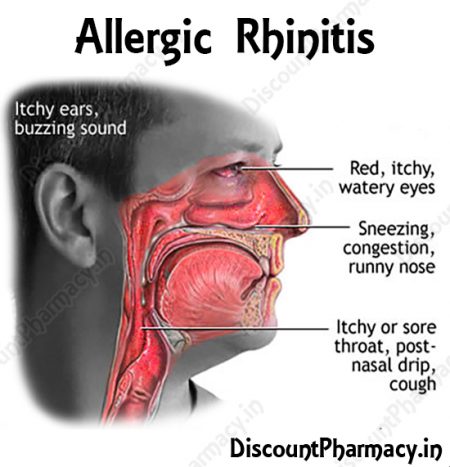Description, causes, prevention, treatment and medicines
Rhinitis means inflammation of the lining of the nose. Allergic rhinitis means that this inflammation is caused by an allergy rather than an infection.
Allergic rhinitis can be categorised into 2 groups:
- seasonal allergic rhinitis – where symptoms occur at particular times of the year: and

allergic rhinitis
- perennial allergic rhinitis – where symptoms occur at any time of the year.
The common name for allergic rhinitis is hay fever. When people say they have hay fever, they generally mean they have seasonal allergic rhinitis.
Symptoms
- Sneezing bouts.
- Itchy nose, eyes, palate and ears.
- Runny nose: lots of watery fluid streaming from the nose.
- Watery, red, puffy eyes — often itchy.
- A blocked nose, and sometimes blocked ears as well.
- A sore throat, tickly cough and husky voice.
- Bad breath.
If your allergic rhinitis is severe and untreated, you might sleep poorly at night, and become sleepy during the day. You may be more prone to sinus infections and eye infections. If you have asthma, allergic rhinitis can make your asthma symptoms more difficult to control.
Causes
Substances that cause allergic rhinitis are present in the air and are breathed into the nose. They include:
- grass, weed and tree pollens;
- house dust mite faeces (‘dust mite allergen’);
- mould spores;
- animal dander (hair and skin flakes) especially from cats; and less commonly
- cockroach droppings (‘cockroach allergen’).
Wind-borne pollens are the cause of seasonal allergic rhinitis, which usually occurs in spring and summer. The length of the pollen season depends on where you live and the plant species involved. Dust mite allergen is the most common cause of perennial allergic rhinitis.
Tests and diagnosis
The symptoms of allergic rhinitis can be similar to other conditions that might affect your nose, such as colds or nasal polyps. See your doctor to confirm whether your symptoms are due to allergic rhinitis or some other condition.
It may be obvious from your history which substance (‘allergen’) is causing your rhinitis, or your doctor may need to order allergy blood tests or skin-prick tests to find out what you are allergic to. This is an important step in treating allergic rhinitis, because once you know which allergen is triggering your symptoms, you may be able to avoid it.
Treatment for allergic rhinitis
Allergen avoidance
- An allergen such as pollen can be difficult to avoid, but you might consider doing mainly indoor pursuits during the pollen season, and staying indoors on windy days or just after a thunderstorm.
- Avoid mowing the lawn, and shower after any activities that have exposed you to a lot of pollen.
- If you are allergic to pet dander, keep your pet outdoors.
- Allergy proof your home by minimising house dust mites by keeping your house well ventilated, avoiding a build up of moist air inside the house, selecting furnishings and floor coverings that don’t encourage dust, covering mattresses and pillows with dust mite covers, using a vacuum cleaner with an appropriate air filter, and using damp dusting techniques when house cleaning.
- Soft toys are a common resting place for house dust mites, so wash them regularly in hot water, and avoid keeping toys on the bed.
Medicines
Medicines to treat and help prevent allergic rhinitis are available from your doctor or over-the-counter at your pharmacy. These can be very effective in reducing your symptoms. Always continue to avoid allergens whenever possible, even when taking medicines.
These medicines are either taken by mouth (usually as a tablet) or as a nasal spray, and include:
- antihistamines (ask for the non-sedating type for daytime use);
- corticosteroid nasal spray;
- decongestants (for short-term use — less than 5 days); and
- combination products that combine these medicines, such as a tablet containing an antihistamine and a decongestant.
Ipratropium bromide (e.g. Atrovent Nasal) is another nasal spray that your doctor may recommend for a severe runny nose.
Sodium cromoglycate nasal spray (e.g. Rynacrom) can help prevent allergic rhinitis symptoms.
Montelukast sodium (brand name Singulair), a leukotriene receptor antagonist, is a prescription medicine that is available in tablet form for treating the symptoms of allergic rhinitis. Leukotriene receptor antagonists may be recommended for children with allergic rhinitis and asthma, as they may be effective for both conditions.
Some medicines are started before the pollen season, and taken every day to help prevent your symptoms occurring. Others can be used ‘as needed’ for quick relief when symptoms occur. Your doctor can advise you on which option is best for you.
Immunotherapy
If allergic rhinitis symptoms are still troublesome despite the use of allergen avoidance and appropriate medicines, immunotherapy may have a place in addition to these measures. This is prescribed by an allergy specialist and means you receive a very small amount of the allergen by repeated injections, with the amount increasing gradually over several years. The aim is to desensitise you to the allergen, and reduce or even eliminate your symptoms.
